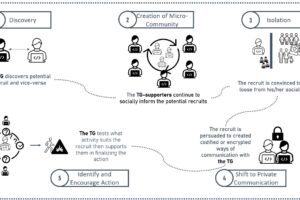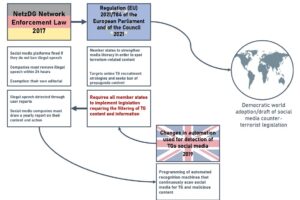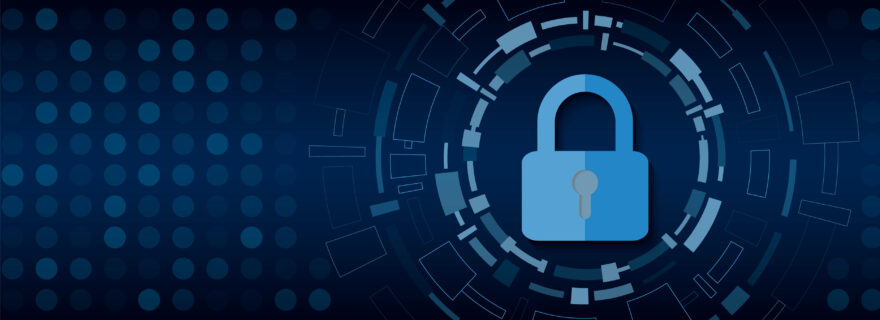Crypto security through non-legal agents: The people against terror
By considering Zamboni’s (2015) ideas on globalisation of politics and values, this blog discusses how (inter)national regulation, and the average person can counter terrorism through social media.
1. Decrypting terrorism: Inter(national) recruitment
Mythen and Walklate (2006, p. 382) characterise new terrorist groups (TG) through their transnational action sphere. TGs are non-State actors, who use digitalised recruitment methods to persuade nationals to act on their behalf (Ball, 2019). The process (Figure 1) aims to indoctrinate the recruit (Berger, 2015), pursuing an allegiance that climaxes with benevolent death. Durkheim (1897) categorised this as “fatalistic suicide”, proving complete disenchantment with the world and submersing into the groups’ customs.


Digitalised recruitment and radicalisation target national security but should be universally countered through non-linear globalisation (Zamboni, 2015). Before illustrating the construction of non-linearity through German and EU policies, Zamboni’s (2015) ideas are considered.
Zamboni (2015) describes the non-linear law-making model, by connecting the national and global action spheres, which through interaction result in multilateral legislation. He sustains that although political institutions are responsible for legal drafting and implementation, non-legal actors are essential in triggering the process, even if they require previous legal justification (Zamboni, 2015, p. 134). Non-legal actors are social media users, whereas legal actors are the States, as exemplified in the German and EU policies.
2. Social media: For and counter terrorism
As Zamboni (2015) explained, the world’s interconnectivity is reflected in non-linear law-making, and consequently in the globalisation of the legal system. The recently adopted EU and German legislation illustrate this idea (Figure 2). The laws commend the removal of TG-favourable content through manual and algorithmic processes (Deutscher Bundestag, 2017; European Parliament and Council, 2021) allowing platforms and users to resist TG recruitment.


Content prohibition has been publicly scrutinised through freedom of speech
(FoS) narratives. Previously, content filters were internally regulated,
however State involvement brought new socio-legal issues to the surface. Here,
Mythen and Walklate (2006, p. 381) argue that TGs are terrorist for the
threatened States but symbolise their follower’s freedom. Whose ideals prevail?
The dilemma revolves around TG-associated values, national sovereignty, and the
globalisation of values (Zamboni, 2015).
3. Globalising values and social media: Whose freedom wins?
Social media counterterrorism policies prevail despite the FoS debate due to national security and globalised democratic State values. Such values are hegemonic and support the most universal rights and freedoms (Mouffe, 1993). These values further individual rights and ensure (trans)national sovereignty. It is unsurprising that the global majority aims for the implementation of democratic standards.
TGs threaten this regime; therefore, their messages cannot be considered under FoS but should be reduced through (inter)national legislation (Macdonald, S., Correia, S., & Watkin, A., 2019). Given the dark web’s vastness, it is difficult to conceive how it can be controlled. However, it is possible to regulate social media platforms in the interest of national security, therefore ensuring FoS for the nation’s citizens by reducing the threat of terrorism.
Because national security relies on international partnerships, the unified global approach to social media is indispensable. As Figure 2 shows, it is through the double-sided (supra/national) legislation that nations can enforce content prohibition. Here, globalisation and the globalisation of values as presented by Zamboni (2015) is highlighted. Through global filtering of digital TG recruitment, the threat of citizen-based sporadic and transnational attacks diminishes. The value in question surpasses FoS, in favour of citizen protection and national sovereignty.
It is not only the value or legal category that is pursued, but also the policies. Under the globalisation of politics of law, Zamboni (2015) describes legislation that is cohesively and structurally implemented. Although the EU offers a strong example of this, it is possible to uncover other similar legislation outside the EU, e.g., in the United States. Considering the above, the final point remains: how can the average Joe and Jane prevent terrorism?
4. Ordinary people – extraordinary impact
Counterterrorism is a State responsibility, though social media is not. These user-enabled platforms, however, function by identifying and reporting TGs. In this context, non-legal actors matter.
Individuals spread information and create moral panics (Auerhahn, 2006). An individual can draw mass online attention and thus propagate certain ideals. The individual, through their voice and consumption, can censor or spread information, demanding actions on uncovered issues such as Palestine and Myanmar.
As Zamboni (2015) said, the role of the non-legal actor in creating globalised values and politics should not be understated. I am an average Jane, and through personal research I wrote this piece which will hopefully inform and encourage understanding of individual roles in counterterrorism and national defence. If social media is as social as it claims to be, it can socialise the world to become more aware and push State action.



0 Comments
Add a comment